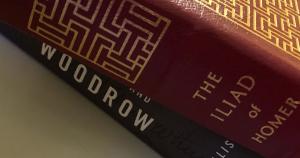 Captain Kirk famously went to planet, meeting green women and logical puzzles, but the men in red shirts from the Enterprise that went with him? They did not thrive or survive. Often they did not make it to the second commercial break.* The named characters in old television were almost certain to survive, unless the actor playing them died between seasons, so if death was to happen, then the unnamed character had to die. If three characters beamed down, the one you did not know from last week was going to die.
Captain Kirk famously went to planet, meeting green women and logical puzzles, but the men in red shirts from the Enterprise that went with him? They did not thrive or survive. Often they did not make it to the second commercial break.* The named characters in old television were almost certain to survive, unless the actor playing them died between seasons, so if death was to happen, then the unnamed character had to die. If three characters beamed down, the one you did not know from last week was going to die.
Here is a truth: God has no red shirts. We are all named characters to God. I was reminded of this fact by Gene Roddenberry and Homer. Next week, for the thirty something time, we will read the Iliad. Once again a new student will remake “Wow! Yahweh is better than Athena!”
There will be more exclamation points. A good professor helps the students find a better topic, not because this sincere, painfully sincere, student is wrong, but because: “Sigh. Of course.” The insight is not new, nor difficult, and a paper topic should have one characteristic or another.
Yahweh, if God exists, is greater than Athena, if both exist.
Idiotic people who think polytheism is just monotheism with more gods rarely have read Iliad. The gods of Iliad are not all Good, they are not even good. They are not all wise, since they are often not even clever. If Athena is the best of the mess on Olympus, she is merely deathless, so she has learned a thing or two over time. She lacks life and that more abundantly.
The Iliad begins by stating that it was the will of the chief god, Zeus, that many Greeks becomes a feast to dogs and vultures.** Having come by sea, roving over the dark desert that was the Homeric ocean, the Greeks will die on land in a strange place. Their bodies will not be honored by funeral feasts, like Achilles at the end of the Iliad, but will be the celebration for base animal: dogs, vultures. The Greeks did not have our high view of dogs generally, though in the Odysseus, the hero has a noble dog: Odysseus makes everyone heroic. In the Iliad, the funeral games, the rites of heroes, will be a dog tearing at the flesh or a vulture picking out the eyes.
Who are these Greeks? They are unnamed. These Greeks will die unknown: snack food for animals. When one of these Greeks, the masses who die on the plains of Troy while heroes are heroic, is given a voice, he is an apish fool: Thersites. From Homer’s point of view, he may be right to wish to go home (ten years of war!), but he is also acting inappropriately. Thersites is not to reason why, his but to do or die. He gets the beating he deserves in the view of his betters and the Greeks go on being vulture food. Like Roddenberry’s secular Federation, the unnamed in Homer’s Greece are there to die.
Against this view of the rest of us one finds the God of the Bible who recollects all of us by name. All of us die, heroes included, but none of us is forgotten. We can all be heroic, God knows all our names. We die now, to live eternally. Paradise is not reserved for heroes, but all of us if we name the name of Jesus. We may become for a moment the prey of dogs and vultures, but we can choose to live in bliss with God forever!
Yahweh is better than Athena, but that’s too obvious for an academic paper. Maybe, however, reminding a few people here will help!
———————————————-
*Speak in LA enough and eventually such a reference will cause a handsome older man to come to you and point out that he had been killed by a Horta as such a red shirt!
**Translations my own.











